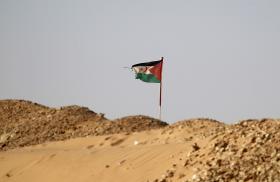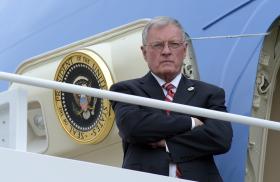
- Policy Analysis
- Fikra Forum
“Trump Triumphant”: The Middle East between Two Nuclear Deals

The June 12 image of U.S. President Donald Trump and North Korean Leader Kim Jong-Un signing an “agreement on denuclearization” in Singapore has provided Arab political discourse’s two competing narratives new tools to push their diametrically opposed characterizations of the future awaiting the Middle East. One view hails the meeting as part of a global course correction from the world’s superpower, towards, among other things, restoring stability in the Middle East, while the other assesses the same encounter as a harbinger of increased tensions and conflict for the region in the foreseeable future. Yet, paradoxically, both readings agree that Trump has gained the upper hand for himself and for the United States, even as they differ on the value judgment of his achievement.
Proclaiming an open departure from—or even a denunciation of—the policies of former U.S. President Barrack Obama, the Trump administration has benefitted from nearly unqualified support from a triad of Middle Eastern states: Israel, Saudi Arabia, and the United Arab Emirates. Each states’ main point of contention towards the previous U.S. administration was its hastened pursuit of a “deal” with Iran, which contained stipulations arguably disadvantageous to the United States itself and disregarded the interests and warnings of regional allies. The Obama administration, they furthermore complained, had kept them in the dark during much of the process on an issue that deeply impacted their national security.
The Trump administration’s repudiation of the JCPOA and its announced pursuit of a new proactive strategy to counter Iranian expansionism were welcome as a rectification of a policy deviation, as each state proved eager to restore their damaged partnership with Washington. Conscious of the pressure Donald Trump faced personally as a newly-elected, unconventional President who eschewed expected norms of behavior and engaged in digressive battles, the media outlets loyal to Saudi Arabia and the UAE have transitioned their coverage of Trump from an initial catering to public bewilderment to a portrayal of his actions and positions as consistent, coherent, and deliberate―even if not readily discernible as such by the general public.
In fact, the model of leadership thus assigned to Trump fit the template of government already promoted in Gulf media (with the confused exception of Qatar)―a model that is duly and actively paternalistic. Ruler paternalism in UAE-based media is evident in internal coverage, where benign rulers usher the Emirates to progress, and even more explicitly in the underlying critique of the “Arab Spring” as destructive in its challenge to the gravitas and organic legitimacy of national leaders. Paternalism has also been recently sharpened and enhanced in the Saudi context, centering around Crown Prince Muhammad Bin Salman as the responsible and irreproachable leader with foresight.
It is also noteworthy that Qatar-supported media—which is faulted and targeted by the UAE and Saudi Arabia for the selective and uneven space it accords for critical politics—has not embraced the counter-model of Trump as an erratic, unthoughtful leader. While its opinion pieces have some allusions to such a portrayal, an editorial effort presenting itself as seeking objectivity or neutrality insures that the overall balance of coverage avoids negative characterizations of Donald Trump. Consequently, the iconoclasm of Al Jazeera and other Qatari funded media has largely retreated to a focus on Gulf foes.
With the established record of Arab media covering the activities of political leaders through a formula that focuses on form instead of content, the Singapore U.S.–North Korea summit offered media sources the full range of pomp and circumstance. Even on international and Europe-based Arabic language networks, the language used to characterize the signing failed to distinguish between a summit statement and a ratified treaty. Even accounting for repeated qualifications by invited guests and reporting journalists, the channels ubiquitously affirmed the “historic” nature of the event as a tipping point in international affairs and a major breakthrough in denuclearization. This hyperbole, however, may be less a bona fide assessment of the event than representative of a pragmatic position towards the Trump administration.
In the Arab media sponsored by U.S. allies and partners, Trump comes across as a proactive decision-maker who is capable of both scraping a nuclear deal that does not meet the U.S. interest litmus test (Iran) and concluding another that satisfies his requirements (North Korea). Whether this is indeed the conviction of the leaders in Saudi Arabia, the UAE, and Qatar is irrelevant. North Korea is beyond the political horizon of virtually all regional capitals, while the concern in gulf capitals over shaping a policy alternative to the JCPOA has retreated to a distant second or third place.
Iran is still an integral, primary concern for Saudi Arabia and the Emirates, but the threat that commands urgency is geographic, not nuclear. For more than three years, Saudi and Emirati forces have been trapped in a costly war in Yemen designed to interdict a complete takeover of the country by the Zaydi Shi‘i tribal Houthi militia, whom Iran recruited as an ideological ally. Initiated without thorough consultation with Washington prior to the election of Donald Trump, the war has failed to achieve its goals while exacerbating Yemen’s humanitarian crisis―disrupting frail aid routes and inflicting an indefensible toll on civilians.
The current primary interest of Riyadh and Abu Dhabi in Washington is that the Trump administration overcome pressure from Congress and provide logistic and strategic support for the Arab coalition in Yemen. A secondary Saudi-UAE interest is for Washington to allow further action against Qatar, even if merely through a neutral stance towards their current approach of applying economic, diplomatic, and logistic pressure to force Doha’s retreat. On the Qatari side, the paramount concern is the opposing desire of maintaining the U.S. umbrella while denying Saudi Arabia and the UAE the backing to make good on their threatened aggressive steps. In these three capitals, and in others across the region agnostic to North Korean issues, the endorsement of the “achievement” in Singapore is a readily available no-cost means of enhancing relations with the Trump administration.
In Arab media hostile to the United States, the actions and positions of Trump at the Singapore summit are assessed as Machiavellian maneuvers that alternated loud threats of fire and fury, soft promises of protection and support, abrupt cancellations, and reinstatements, all intended to maintain the upper hand. In this light, the United States is relentless in dictating its will and will only honor its own self-interest. Some in the anti-U.S. media have echoed the Iranian portrayal of Trump as a political novice who lacks good judgment. Even then, however, the tendency has been to ascribe malevolent intent to the United States through its presumed governance by a “Deep State.” The purpose of the swift conclusion of a “nuclear deal” with North Korea, according to these narratives, is to downgrade the priority of one hot international issue in order to dedicate efforts and attention to another, namely Iran. The references to Iran by Donald Trump in the course of his press conference in Singapore are thus treated as all but incidental. The ultimate purpose of the meeting with Kim Jong-Un was to better position the United States in its hostile stand towards Iran.
Arab political culture has issued opposing policy recommendations: its anti-U.S. circles have recycled Iranian advice to North Korea not to trust the United States as, having reneged on its Iran deal, it is not prone to honor its North Korean equivalent. Outlets supported by U.S. allies featured warnings to Iran to follow the course of North Korea and resign itself to the implications of the determination displayed by the new U.S. President.
Few in politics and media in the Arab Middle East have engaged in the question of whether in fact Trump secured any tangible achievement in the Singapore meeting, or whether the summit statement has set the course for an actual denuclearization process. The portrayal of Trump as out-maneuvered by a foe, or as a “paper tiger” claiming false victories, serves neither those supportive of a proactive U.S. policy against Iran nor the Iranian call for a mobilization against U.S. arrogance and brute force. Media outlets have further determined that the Arabic speaking public has no objective reason to follow the intricacies of a Washington policy motivated by and centered on internal considerations. For policy-makers and their opinion propagators in either camp, regarding the new denuclearization agreement all concur on “Trump triumphant.”


